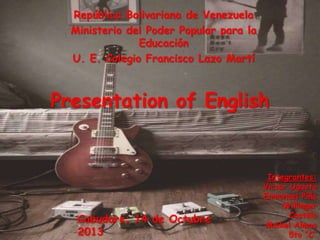
Presentación del Presente Continuo, Pasado Continuo y Futuro Continuo en inglés
- 1. República Bolivariana de Venezuela Ministerio del Poder Popular para la Educación U. E. Colegio Francisco Lazo Martí Presentation of English Cabudare; 14 de Octubre 2013 Integrantes: Victor Ugueto Enmanuel Piña Willinger Castillo Maikel Almao 5to “C”
- 2. Presente Continuo El Presente Continuo o Presente Progresivo es un tiempo verbal que se utiliza para expresar acciones que suceden en el mismo momento en que se está hablando, por ejemplo: I am speaking English. Yo estoy hablando inglés. (Está sucediendo ahora). Formula Este tiempo verbal se construye utilizando como auxiliar el Presente Simple del modo indicativo del verbo TO BE y como verbo principal en infinitivo con la terminación ING Ejemplos I am studing, They are Singing, He are’n sleeping Ejercicios 1°-¿What are you doing right now? - I am eating Pizza right now 2°-¿They are playing soccer right now? -Yes, We are playing soccer right now - No, We aren’t playing soccer right now
- 3. Pasado Continuo El Pasado Continuo, es un tiempo verbal que describe acciones que estaban siendo realizadas en un momento del pasado al que se hace referencia y que luego continuaron, por ejemplo: Yesterday he was studying English. Ayer él estaba estudiando inglés.(Comenzó a estudiar antes de ese momento y continuó estudiando posteriormente) Formula El Pasado Continuo se construye con el verbo auxiliar “to be” en su forma pasada y el verbo principal en infinitivo con la terminación ING Ejemplos I was study, They were’nt singing he weren’t sleeping Ejercicios 1°-¿Where were you playing? – I was playing in the garden 2°-¿They were watching TV? - Yes, We were watching TV -No, We weren’t watching TV
- 4. Futuro Continuo El Futuro Continuo es un tiempo verbal que se utiliza para describir una acción que tendrá lugar en el futuro, que puede especificarse o no, y que seguirá desarrollándose en ese momento, por ejemplo: I will be studying la lección. Yo estaré estudiando la lección. Formula Para construir su forma afirmativa se utiliza el futuro simple del verbo auxiliar TO BE y el verbo principal con la terminación ING Ejemplos I will be studing, They will be singing, He will not be sleeping Ejercicios ¿Will you be going? - I will be going to the gym ¿They Will be listening Linkin Park? Yes, We will be listening Linkin Park No, We will be not listening Linkin Park
